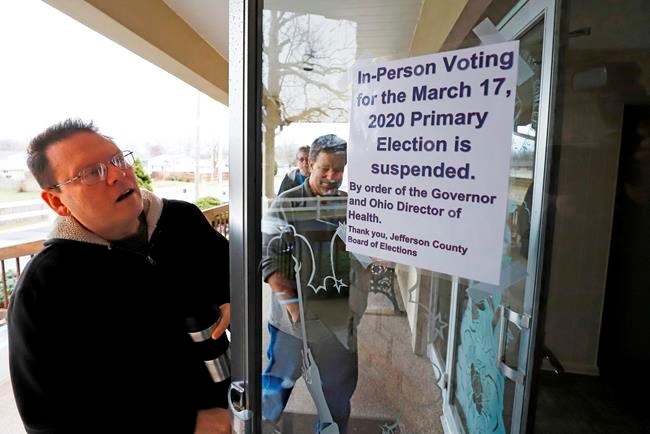WASHINGTON — Movie theatres are shuttered, schools and universities unnervingly quiet, businesses and borders are turning people away and North America is bracing for the worst as the urgency surrounding the COVID-19 outbreak escalates, almost by the hour.
And yet voters in three states cast ballots in person Tuesday as the two-man battle to lead the Democrats back to the White House continued to rage, counter to the strenuous efforts of public health officials to keep people from gathering in large groups.
In Ohio, which was also supposed to be voting this week, polls were shut down late Monday after officials declared a health emergency. Voting went ahead in Illinois, as well as in Florida and Arizona — two states known as sanctuaries for seniors, who face the greatest risk from the virus.
"On one hand, we're saying ... people 65 and older should avoid contact with other people, as much as humanly possible. They should stay home as much as humanly possible," Ohio Gov. Mike DeWine, who unsuccessfully tried Monday to get the courts to postpone his state's primary, said in an interview on Fox News.
"On the other hand, we're saying, 'Hey, it's OK, you know, they need to go vote.'"
Others are frustrated with the fact that voting is even necessary at this stage in primary season, and they lay the blame squarely at the feet of Bernie Sanders, who has been steadily losing ground to former vice-president Joe Biden and whose path to the nomination has grown increasingly narrow. It grew narrower still Tuesday as Biden claimed wins in Florida and Illinois before the polls even closed in Arizona.
"It's incredibly irresponsible of Sanders to continue campaigning when he has no chance, given the health crisis," said David Greenberg, a history and journalism professor at Rutgers University in New Brunswick, N.J.
"He knows he can't win. Any concessions he might wring from Biden are of minuscule importance in the larger scheme of things. He has a chance now to show leadership and also to model magnanimous and public-spirited behaviour. Let's hope he rises to the occasion, for everyone's sake."
Supporters of the famously progressive independent senator from Vermont, on the other hand, insisted the fight is far from over, and pointed the finger at state-level electoral systems that have yet to embrace absentee voting on a national scale.
States like California, for instance, permit all voters to mark their ballots at home and mail them as late as midnight on election day — a system that encourages widespread participation, but makes tabulating results a drawn-out affair. It took nearly two weeks for Sanders to be declared the winner of the March 3 primary, the only bright spot for his campaign on what was an otherwise dismal Super Tuesday.
"Democrats hold the right to vote as supreme," said Julie Buchanan, an expatriate U.S. citizen living in Toronto and the vice-chairwoman of the Canadian branch of Democrats Abroad, a party offshoot that encourages and informs expat voters around the world.
"No-reason absentee voting" should be the standard across the country, Buchanan said.
"It is crazy that in this day and age that this is not the norm. Perhaps this will be one of many lessons learned, and will enhance future voting opportunities for all."
Several other states, including Maryland, Georgia, Kentucky and Louisiana, have already postponed their primaries until June. A delay is under consideration in New York, while others like Wyoming have done away with in-person caucuses and are encouraging mail-in ballots.
Florida and Arizona both defended their decisions to proceed, citing numerous options for allowing people to cast a ballot without entering a polling station, as well as expanded use of advance mail-in options.
And Illinois said out loud what others were no doubt thinking: "At this point, there is no date in the foreseeable future when we can expect greater safety with any certainty," elections board spokesman Matt Dietrich told the New York Times.
The pandemic certainly complicated matters Tuesday. In Florida, workers failed to show up at their designated polling places after some 800 volunteers pulled out earlier in the week. Illinois officials scrambled to find alternative locations after venues abruptly cancelled their reservations.
Sanders, who trails Biden by a margin of more than 150 delegates after a dismal night in Michigan last week and a split decision in Washington state that ultimately went to his rival, has made it clear he's not about to drop out — although this week's results could change that.
"An election is a very special thing," President Donald Trump said when asked about DeWine's decision and what the White House is doing to ensure elections can proceed. "We're getting rid of this virus. That's the best thing we can do."
As it happens, Trump's own unsurprising victories in Florida and Illinois allowed him to clinch the Republican nomination.
This report by The Canadian Press was first published March 17, 2020.
— Follow James McCarten on Twitter @CdnPressStyle
James McCarten, The Canadian Press



